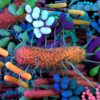The findings from the hefty European-based Developing Human Connectome Project led to the determination that premature birth may lead to a substantial reduction in brain connections.
As part of the European-based project, released in the journal Brain, a group of researchers at King’s College London used magnetic resonance imaging (MRI) to examine over 300 infants, assessing their brain development.
Comparing healthy infants with those born prematurely, healthy infants had similar connectivity in brain areas involved with sensation and movement as adults. Among premature infants, there was a substantial reduction in connectivity between various brain regions.
“The early developmental disruption imposed by preterm birth is associated with extensive alterations in functional connectivity,” according to the study’s authors.
“Eyre et al. map the trajectories of functional brain development at term age with unprecedented detail in 337 infants, showing a primary-to-higher-order ontogenetic sequence of brain development and the extensive effect of preterm birth on neonatal functional connectivity,” the study also showed.
Overall, the findings provide a glimpse at how the brain development of an infant may be altered, paving the way for problems later in life.
“The findings can improve clinical understanding of how a baby’s brain develops and may provide a way to identify subtle alterations leading to problems later in life. Early identification of babies at an increased risk is important in order to develop potential therapeutic strategies. In the future we hope to identify infants that may benefit of targeted interventions as early as few weeks after birth in order to improve their quality of life,” Dafnis Batelle, co-author of the study, asserted in his findings.


